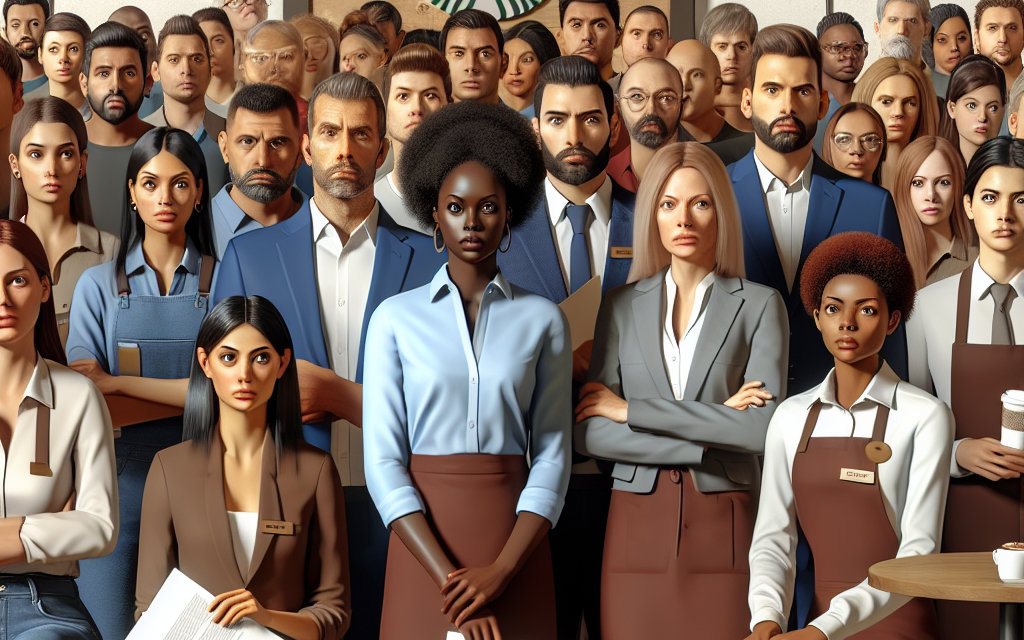“Starbucks Faces Federal Union Complaints from 34 Employees: Brewing Tensions Rise.”
Introduction
Starbucks is facing federal union complaints filed by 34 employees across various locations, alleging unfair labor practices and violations of workers’ rights. These complaints highlight ongoing tensions between the coffee giant and its workforce, particularly as employees seek to unionize and advocate for better working conditions, wages, and benefits. The situation underscores the broader labor movement within the retail and service industries, as workers increasingly demand a voice in their workplaces.
Starbucks Union Complaints Overview
Starbucks has recently found itself at the center of a significant labor dispute, as federal union complaints have been filed by 34 employees across various locations. This development highlights the ongoing tensions between the coffee giant and its workforce, particularly in the context of the growing unionization movement within the company. The complaints, which have been lodged with the National Labor Relations Board (NLRB), allege a range of unfair labor practices that have raised concerns about the treatment of employees and their rights to organize.
As the unionization efforts at Starbucks have gained momentum over the past few years, employees have increasingly sought to voice their grievances regarding working conditions, wages, and benefits. The recent complaints reflect a culmination of frustrations that many workers have experienced, particularly in light of the company’s response to unionization efforts. Employees have reported instances of intimidation, retaliation, and other forms of coercion aimed at discouraging them from joining or supporting unions. Such allegations are serious, as they not only undermine the principles of collective bargaining but also threaten the fundamental rights of workers to organize freely.
Moreover, the complaints filed by these 34 employees are part of a broader trend that has seen a surge in union activity across various sectors, including retail and food service. This movement has been fueled by a growing awareness among workers of their rights and the potential benefits of union representation. In the case of Starbucks, employees have expressed a desire for better working conditions, fair wages, and a more equitable workplace. The filing of these complaints serves as a critical reminder of the challenges that many workers face when attempting to advocate for their rights in a corporate environment.
In response to the allegations, Starbucks has maintained that it respects the rights of its employees to organize and has emphasized its commitment to open communication. However, critics argue that the company’s actions tell a different story. They contend that the measures taken by Starbucks to counter unionization efforts have created a hostile environment for employees who wish to advocate for their rights. This dichotomy between the company’s stated values and the experiences of its workers has fueled further discontent and has prompted calls for greater accountability.
As the NLRB investigates these complaints, the outcome could have significant implications for Starbucks and its employees. If the board finds merit in the allegations, it could lead to legal repercussions for the company, including potential remedies that may require changes in its labor practices. Furthermore, the resolution of these complaints could set a precedent for other companies facing similar unionization efforts, thereby influencing the broader landscape of labor relations in the retail sector.
In conclusion, the recent federal union complaints filed by 34 Starbucks employees underscore the complexities of labor relations within the company. As workers continue to seek representation and advocate for their rights, the situation at Starbucks serves as a microcosm of the larger movement toward unionization in the United States. The outcome of these complaints will not only impact the employees involved but may also shape the future of labor relations in the retail industry as a whole. As the investigation unfolds, it remains to be seen how Starbucks will navigate these challenges and whether it will take meaningful steps to address the concerns raised by its workforce.
Employee Perspectives on Unionization
In recent developments, Starbucks has found itself at the center of a significant labor dispute, as 34 employees have filed federal complaints regarding the company’s handling of unionization efforts. This situation has sparked a broader conversation about employee perspectives on unionization, particularly within the context of the retail and service industries. As workers increasingly seek to assert their rights and improve their working conditions, the role of unions has become a focal point for many employees who feel that their voices are not adequately represented.
The complaints filed against Starbucks highlight a growing sentiment among employees who believe that unionization is essential for fostering a more equitable workplace. Many workers express concerns about issues such as wages, benefits, and job security, which they feel are inadequately addressed by their employer. In this context, unionization is viewed as a viable solution to advocate for better working conditions and to ensure that employees have a platform to voice their grievances. The desire for collective bargaining power is particularly pronounced among younger workers, who are increasingly aware of their rights and the potential benefits of union representation.
Moreover, the complaints against Starbucks underscore the challenges that employees face when attempting to organize. Many workers report experiencing intimidation or retaliation from management when they express interest in unionizing. This creates a climate of fear that can deter employees from pursuing collective action. As a result, the need for legal protections and support for workers seeking to unionize has become more pressing. Employees are calling for a more transparent and supportive environment where they can freely discuss their concerns without fear of repercussions.
In addition to the immediate issues of wages and working conditions, the broader implications of unionization efforts resonate with employees on a deeper level. Many workers view unions as a means of fostering solidarity among colleagues, creating a sense of community and shared purpose. This camaraderie can be particularly important in high-stress environments, where employees often face demanding workloads and customer interactions. By banding together, workers can not only advocate for their rights but also build a support network that enhances their overall job satisfaction.
Furthermore, the current labor landscape is characterized by a growing trend of employees prioritizing their well-being and work-life balance. As such, unionization is increasingly seen as a pathway to achieving these goals. Employees are recognizing that unions can play a crucial role in negotiating for benefits such as flexible scheduling, mental health resources, and improved workplace safety. These considerations are particularly relevant in the wake of the COVID-19 pandemic, which has prompted many workers to reevaluate their priorities and seek more meaningful employment experiences.
In conclusion, the federal complaints filed by Starbucks employees reflect a broader movement toward unionization within the workforce. As employees navigate the complexities of labor relations, their perspectives on unionization are shaped by a desire for better working conditions, job security, and a supportive community. The challenges they face in organizing highlight the need for systemic changes that protect workers’ rights and promote fair labor practices. Ultimately, the ongoing dialogue surrounding unionization will continue to evolve, as employees seek to assert their voices and advocate for a more equitable workplace.
Legal Implications of Federal Complaints
The recent filing of federal union complaints by 34 employees against Starbucks has significant legal implications that could reshape the landscape of labor relations within the company and potentially influence broader industry practices. These complaints, lodged with the National Labor Relations Board (NLRB), allege various violations of labor laws, including unfair labor practices that undermine employees’ rights to organize and engage in collective bargaining. As the situation unfolds, it is essential to understand the potential ramifications of these complaints not only for Starbucks but also for the wider labor movement.
Firstly, the legal framework governing labor relations in the United States is primarily established by the National Labor Relations Act (NLRA). This act protects employees’ rights to organize, join unions, and engage in collective bargaining. When employees allege violations of these rights, as seen in the recent complaints against Starbucks, the NLRB is tasked with investigating the claims and determining whether the company has indeed engaged in unlawful practices. If the NLRB finds merit in the complaints, it could lead to a range of consequences for Starbucks, including the requirement to cease any unlawful practices, reinstate employees who may have been wrongfully terminated, and potentially pay back wages.
Moreover, the legal implications extend beyond immediate remedies for the affected employees. A ruling in favor of the complainants could set a precedent that encourages other employees within Starbucks and beyond to pursue similar actions. This could lead to a wave of unionization efforts across the company’s numerous locations, fundamentally altering the employer-employee dynamic. As more employees become aware of their rights and the protections afforded to them under the NLRA, it is likely that we will see an increase in union activity not only at Starbucks but also in other sectors where employees feel their rights are being infringed upon.
In addition to the potential for increased unionization, the complaints against Starbucks may also prompt a reevaluation of the company’s labor practices and policies. Companies often respond to such allegations by reviewing their internal procedures and training programs to ensure compliance with labor laws. This could lead to changes in how Starbucks manages its workforce, including enhanced training for management on labor relations and employee rights. Such changes may not only mitigate the risk of future complaints but also foster a more positive workplace culture, which can be beneficial for employee morale and retention.
Furthermore, the public relations aspect of these complaints cannot be overlooked. As consumers increasingly prioritize corporate social responsibility, companies like Starbucks may face reputational risks if they are perceived as violating labor rights. Negative publicity surrounding labor disputes can lead to consumer backlash, affecting sales and brand loyalty. Consequently, Starbucks may find it in its best interest to address these complaints proactively, not only to comply with legal requirements but also to maintain its image as a socially responsible employer.
In conclusion, the federal union complaints filed by 34 employees against Starbucks carry significant legal implications that could influence the company’s labor practices and the broader labor movement. As the NLRB investigates these allegations, the outcomes may lead to changes in employee rights awareness, increased unionization efforts, and a reassessment of corporate labor policies. Ultimately, how Starbucks responds to these complaints will not only impact its workforce but also serve as a bellwether for labor relations in the retail sector and beyond.
Impact on Starbucks’ Corporate Culture
The recent federal union complaints filed by 34 employees against Starbucks have sparked significant discussions regarding the company’s corporate culture. As these complaints highlight concerns over labor practices and employee treatment, they also serve as a critical lens through which to examine the broader implications for Starbucks’ internal environment. The allegations, which include claims of unfair labor practices and retaliation against employees seeking to unionize, suggest a growing discontent among staff that could potentially reshape the company’s ethos.
Starbucks has long prided itself on fostering a culture of inclusivity and respect, often positioning itself as a leader in corporate social responsibility. However, the emergence of these complaints raises questions about the authenticity of this image. Employees who feel compelled to voice their grievances through formal channels may indicate a disconnect between the company’s stated values and the lived experiences of its workforce. This dissonance can lead to a decline in employee morale, as individuals may feel unsupported or undervalued in their roles. Consequently, the potential erosion of trust between employees and management could hinder collaboration and innovation, which are essential components of a thriving corporate culture.
Moreover, the complaints may catalyze a shift in employee engagement strategies at Starbucks. As the company navigates these allegations, it may be compelled to reassess its approach to communication and feedback mechanisms. Transparent dialogue between management and staff is crucial in addressing the underlying issues that have led to these complaints. By fostering an environment where employees feel safe to express their concerns, Starbucks can work towards rebuilding trust and reinforcing its commitment to a positive workplace culture. This proactive approach not only addresses immediate grievances but also lays the groundwork for a more resilient corporate culture in the long term.
In addition, the impact of these complaints extends beyond internal dynamics; it also influences Starbucks’ public perception. As consumers increasingly prioritize ethical business practices, the company’s response to these allegations will be closely scrutinized. A failure to adequately address employee concerns could result in reputational damage, potentially alienating a customer base that values corporate accountability. Conversely, a robust and transparent response could enhance Starbucks’ standing as a socially responsible employer, demonstrating a commitment to employee welfare that resonates with consumers.
Furthermore, the situation presents an opportunity for Starbucks to lead by example in the industry. By embracing the principles of fair labor practices and actively supporting employees’ rights to organize, the company can position itself as a pioneer in fostering a positive corporate culture. This commitment not only aligns with the values that many consumers hold dear but also sets a standard for other organizations to follow. In this way, Starbucks can transform a challenging situation into a catalyst for positive change, reinforcing its reputation as a progressive employer.
In conclusion, the federal union complaints from 34 employees represent a pivotal moment for Starbucks, prompting a critical examination of its corporate culture. The implications of these allegations extend beyond immediate labor relations, influencing employee morale, public perception, and industry standards. By addressing these concerns with transparency and a commitment to improvement, Starbucks has the potential to not only rectify current issues but also to strengthen its corporate culture for the future. Ultimately, how the company responds will determine its trajectory in fostering a workplace that truly reflects its stated values.
Comparison with Other Companies’ Union Issues
In recent years, the landscape of labor relations in the United States has been marked by a resurgence of union activity, with various companies facing scrutiny over their treatment of employees seeking to organize. The recent complaints filed against Starbucks by 34 employees highlight a growing trend among corporations that have encountered similar challenges. This situation invites a comparison with other companies that have faced union-related issues, revealing both commonalities and differences in how these organizations have responded to employee demands for better working conditions and representation.
For instance, Amazon has been at the forefront of unionization efforts, with employees in several facilities attempting to form unions to address concerns over working conditions, pay, and job security. The company has faced significant backlash for its aggressive anti-union tactics, which have included mandatory meetings aimed at dissuading employees from organizing. This approach has drawn criticism from labor advocates and has led to increased scrutiny from federal agencies. Similarly, Starbucks has been accused of employing tactics that undermine employees’ rights to organize, as evidenced by the recent federal complaints. Both companies illustrate a broader trend in which large corporations often prioritize maintaining control over their workforce rather than engaging in constructive dialogue with employees.
Moreover, the situation at Starbucks can be juxtaposed with that of other well-known brands, such as Google, which has also faced union-related challenges. In 2020, a group of Google employees formed a union called the Alphabet Workers Union, aiming to address issues such as workplace harassment and ethical concerns regarding the company’s projects. Unlike Starbucks and Amazon, Google has taken a somewhat different approach by allowing for some level of employee organization, albeit with its own set of challenges. The contrast in responses highlights the varying degrees of acceptance and resistance to unionization across different sectors and companies.
Furthermore, the hospitality industry has also seen its share of union-related disputes. For example, major hotel chains like Marriott have faced significant unionization efforts, particularly during the pandemic when workers demanded better health and safety measures. In these cases, the companies often engaged in negotiations with unions, leading to collective bargaining agreements that addressed employee concerns. This contrasts sharply with the Starbucks situation, where employees have reported retaliatory actions against those who have sought to organize, raising questions about the company’s commitment to fostering a fair workplace environment.
As the labor movement continues to gain momentum, the Starbucks complaints serve as a reminder of the challenges that many employees face when attempting to unionize. The experiences of other companies, such as Amazon and Google, underscore the complexities of labor relations in today’s economy. While some organizations have adopted more conciliatory approaches, others have resorted to aggressive tactics to maintain their influence over their workforce. This divergence in strategies not only affects the immediate outcomes for employees but also shapes the broader narrative surrounding labor rights in the United States.
In conclusion, the federal union complaints against Starbucks reflect a significant moment in the ongoing struggle for workers’ rights. By examining the experiences of other companies facing similar challenges, it becomes evident that the path to unionization is fraught with obstacles, yet it also presents opportunities for meaningful change. As employees continue to advocate for their rights, the responses of corporations will undoubtedly play a crucial role in shaping the future of labor relations in the country.
Future of Starbucks and Employee Relations
The future of Starbucks and its employee relations is currently under scrutiny, particularly in light of recent federal union complaints filed by 34 employees. These complaints highlight a growing tension between the company and its workforce, raising questions about the effectiveness of Starbucks’ labor practices and its commitment to fostering a positive work environment. As the landscape of labor relations evolves, it is essential to examine the implications of these developments for both the company and its employees.
Starbucks has long positioned itself as a leader in corporate social responsibility, often touting its commitment to ethical sourcing, community engagement, and employee benefits. However, the recent complaints suggest that the company may be falling short in its labor relations, particularly as employees seek to unionize and advocate for better working conditions. The complaints filed with the National Labor Relations Board (NLRB) allege various violations, including unfair labor practices and retaliation against employees who express their desire to organize. Such allegations not only threaten the company’s reputation but also signal a potential shift in the dynamics of employee relations within the organization.
As employees increasingly seek to unionize, the implications for Starbucks are significant. The company must navigate a complex landscape of labor laws and employee rights while maintaining its brand image. The rise of unionization efforts among Starbucks employees reflects a broader trend in the labor market, where workers across various industries are demanding more equitable treatment and better working conditions. This movement is fueled by a growing awareness of labor rights and a desire for collective bargaining power, which can lead to improved wages, benefits, and job security.
In response to these challenges, Starbucks has the opportunity to reassess its approach to employee relations. By engaging in open dialogue with employees and addressing their concerns, the company can work towards rebuilding trust and fostering a more collaborative work environment. This may involve reevaluating its policies and practices to ensure they align with the needs and expectations of its workforce. Moreover, embracing a more transparent and inclusive approach to decision-making can help mitigate tensions and create a sense of shared purpose among employees.
Furthermore, the company must recognize that the future of its workforce is intrinsically linked to its overall success. A satisfied and engaged workforce is essential for maintaining high levels of customer service and brand loyalty. Therefore, investing in employee relations is not merely a matter of compliance with labor laws; it is a strategic imperative that can drive long-term growth and sustainability. By prioritizing employee well-being and fostering a culture of respect and collaboration, Starbucks can position itself as a model for other companies navigating similar challenges.
In conclusion, the recent federal union complaints from 34 employees serve as a critical reminder of the evolving landscape of labor relations at Starbucks. As the company faces increasing pressure to address employee concerns, it has the opportunity to redefine its approach to workforce engagement. By embracing transparency, fostering open communication, and prioritizing employee well-being, Starbucks can not only address the immediate challenges posed by unionization efforts but also lay the groundwork for a more resilient and equitable future. Ultimately, the way Starbucks navigates these issues will have lasting implications for its brand, its employees, and its position within the broader labor market.
Public Response to Starbucks Union Complaints
In recent weeks, Starbucks has found itself at the center of a growing controversy as 34 employees filed federal complaints regarding union-related issues. This development has sparked a significant public response, reflecting a broader conversation about labor rights and corporate responsibility in the modern workplace. As the complaints unfold, various stakeholders, including customers, labor advocates, and industry analysts, have begun to weigh in on the implications of these allegations for both the company and its employees.
The complaints, which have been lodged with the National Labor Relations Board, allege that Starbucks has engaged in unfair labor practices, including intimidation and retaliation against employees who have sought to organize. This situation has not only drawn attention from labor unions but has also resonated with a public increasingly aware of workers’ rights. Many consumers have expressed their support for the employees, advocating for fair treatment and the right to unionize without fear of retribution. Social media platforms have become a battleground for discussions surrounding the issue, with hashtags related to the complaints trending as supporters rally around the affected employees.
Moreover, the public response has been amplified by the growing trend of unionization across various sectors, particularly in the service industry. As more workers seek to unionize, the Starbucks complaints serve as a critical case study in the ongoing struggle for labor rights. This situation has prompted many to reflect on the ethical responsibilities of corporations, particularly those that pride themselves on progressive values. Starbucks, known for its commitment to social responsibility, now faces scrutiny regarding its treatment of employees who wish to organize. This contradiction has not gone unnoticed by consumers, many of whom are reconsidering their loyalty to the brand in light of these allegations.
In addition to consumer sentiment, labor organizations have also taken a keen interest in the unfolding situation. Unions across the country have rallied to support the Starbucks employees, emphasizing the importance of solidarity in the face of corporate resistance. This collective action highlights a growing movement among workers who are increasingly willing to stand up against perceived injustices in their workplaces. The public response has thus become a rallying cry for labor rights, with many viewing the Starbucks complaints as emblematic of larger systemic issues within corporate America.
As the situation develops, it remains to be seen how Starbucks will respond to these allegations. The company has historically positioned itself as a leader in corporate social responsibility, and the current complaints could pose a significant challenge to its public image. Stakeholders are closely monitoring the company’s actions, as any perceived failure to address the concerns raised by employees could lead to further backlash from consumers and labor advocates alike.
In conclusion, the federal union complaints filed by 34 Starbucks employees have ignited a robust public response that underscores the complexities of labor relations in today’s economy. As consumers and labor advocates rally in support of the employees, the situation serves as a reminder of the ongoing struggle for workers’ rights and the critical role that public sentiment plays in shaping corporate behavior. The outcome of this controversy may not only impact Starbucks but could also influence broader trends in labor organization and corporate accountability in the years to come.
Q&A
1. **What is the main issue behind the federal union complaints against Starbucks?**
– Employees have filed complaints alleging unfair labor practices, including retaliation against union organizers and failure to negotiate in good faith.
2. **How many employees are involved in the complaints?**
– A total of 34 employees have filed the complaints.
3. **Which federal agency is handling the complaints?**
– The National Labor Relations Board (NLRB) is overseeing the complaints.
4. **What specific actions are the employees accusing Starbucks of?**
– Employees accuse Starbucks of firing union supporters, changing working conditions without negotiation, and engaging in intimidation tactics.
5. **What has Starbucks’ response been to the complaints?**
– Starbucks has denied the allegations, stating that they are committed to following labor laws and maintaining a positive work environment.
6. **What impact could these complaints have on Starbucks?**
– The complaints could lead to legal repercussions, potential fines, and increased scrutiny of Starbucks’ labor practices.
7. **What is the broader context of these complaints within the company?**
– The complaints are part of a larger trend of unionization efforts at Starbucks locations across the country, reflecting growing employee activism in the retail sector.
Conclusion
Starbucks is facing significant challenges as 34 employees have filed federal complaints regarding unfair labor practices, highlighting ongoing tensions between the company and its workforce. These complaints reflect broader issues related to employee rights, unionization efforts, and the company’s response to labor organizing. The situation underscores the need for Starbucks to address employee concerns and foster a more supportive work environment to mitigate potential legal repercussions and maintain its reputation.





